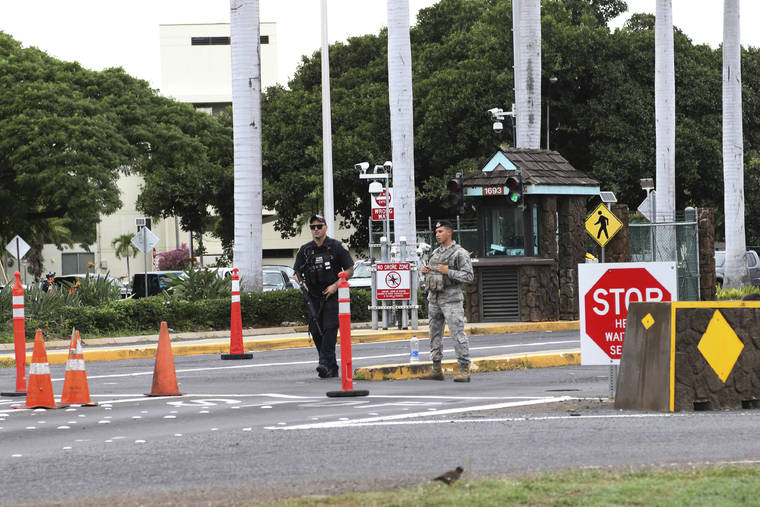HONOLULU — The Navy said Tuesday its investigation into a shooting at Pearl Harbor last December was unable to determine what caused a submarine sailor to fire his service weapon at three civilian workers, killing two and wounding one, before he fatally shot himself.
But the Navy’s investigative report said 22-year-old Gabriel Romero had “several stressors” in his life in the months leading up to the shooting that together “likely led him to choose violence.”
Further, the report said the U.S. Pacific Fleet submarine force’s mental health program failed to properly diagnose Romero’s mental health condition during eight visits he made to a clinic between September and November 2019.
Still, U.S. Pacific Fleet Commander Adm. John Aquilino said no one could have predicted Romero would “engage in this ultimate act of murder and suicide” even if his mental health issues and his grievances had been known.
“This lack of predictability on mass shooting incidences, despite information that often does emerge after the fact as ‘warning signs’ has confounded experts across the globe,” Aquilino said in a memo forwarding the report to the vice chief of naval operations.
Romero was assigned to the USS Columbia submarine, which was in dry dock at the Pearl Harbor Naval Shipyard at the time of the Dec. 4 shooting. His job was to stand watch and provide security for the submarine.
He used his service-issued M-4 rifle to shoot the civilians and a service-issued M-9 rifle to shoot himself immediately afterward. The shooting — which killed Roldan Agustin, 49, and Vincent Kapoi Jr., 30, and wounded Roger Nakamine, 36 — lasted a few seconds.
Romero completed annual arms screening in September 2019. But he was not re-screened even though the Navy was aware of multiple “risk factors” including: two single motor vehicle accidents within a year, general isolation from his shipmates, repeated counseling, a disciplinary review board, a failure to be promoted and an executive officer inquiry the day before the shooting.
The report singled out shortcomings by the submarine force’s mental health program, which diagnosed Romero with “phase of life problems.” Romero met with a licensed provider at the program’s Pearl Harbor clinic once. But his remaining seven visits were with a behavioral health technician who was an unlicensed enlisted sailor.
Staff shortages contributed to a lack of proper oversight of the unlicensed technician, the report said.
A forensic psychiatrist who reviewed Romero’s case for the investigation said Romero showed signs of an undiagnosed mental disorder.
The psychiatrist said the most probable diagnoses for Romero, in order of likelihood, were as follows: autistic spectrum disorder, attention deficit and hyperactivity disorder, social anxiety disorder, personality disorder, anxiety disorder, depressive disorder and adjustment disorder. All of the above would likely disqualify a sailor from submarine duty, except for adjustment disorder, the report said.
Further, Aquilino said the USS Columbia’s medical representative was unaware of Romero’s clinic visits. He said this lack of communication “creates a serious vulnerability in military readiness which is unacceptable.” He said the service member’s right to confidentiality must be balanced against evaluating what information is necessary to relay to the chain of command.
“The overly conservative stance on patient confidentiality served neither the patient nor the command well in this situation,” the admiral said.


